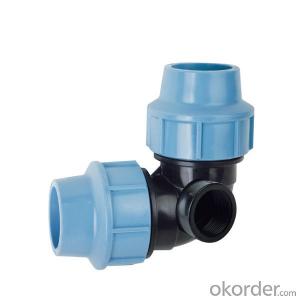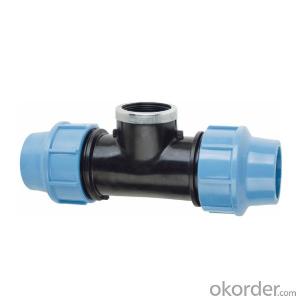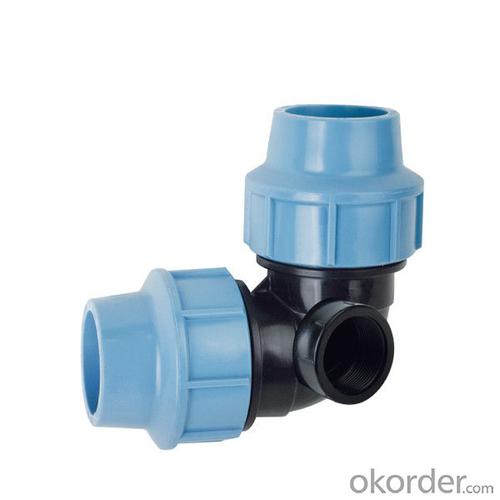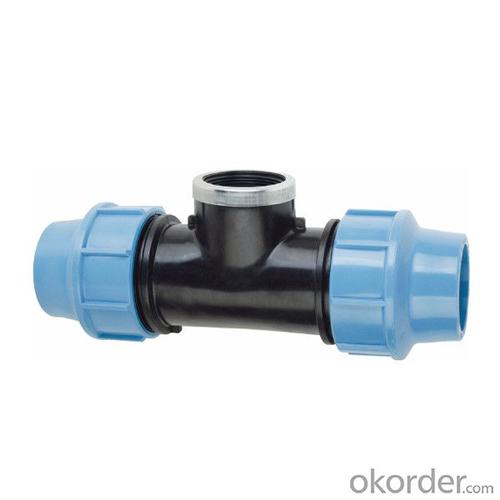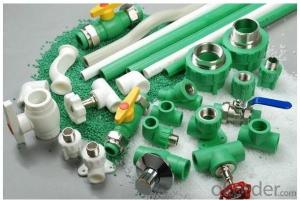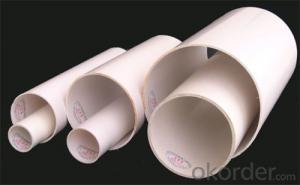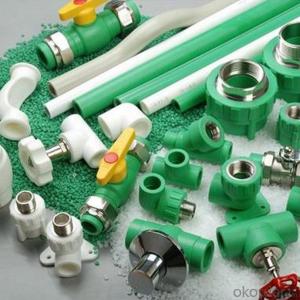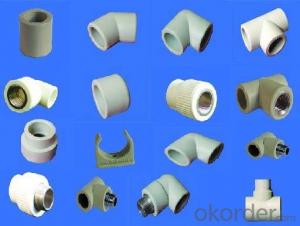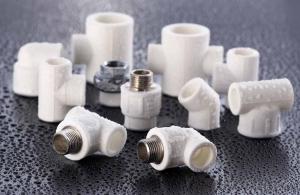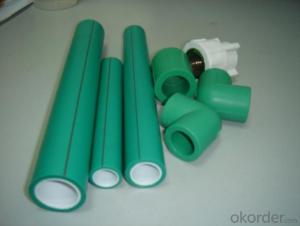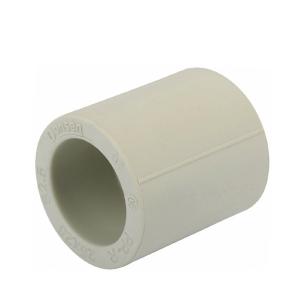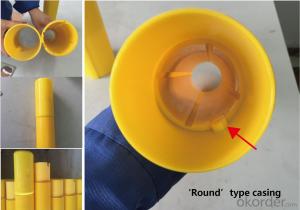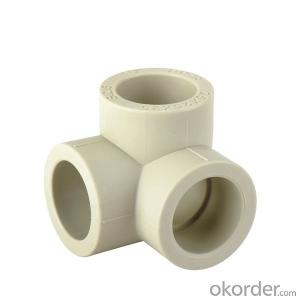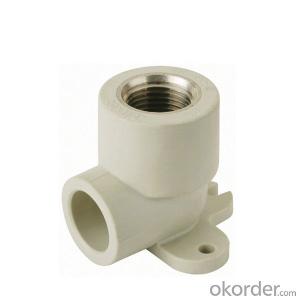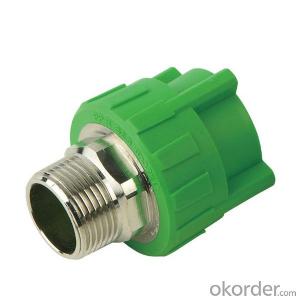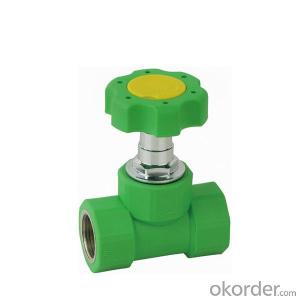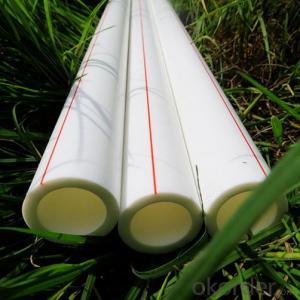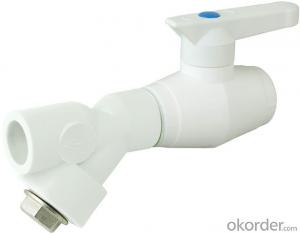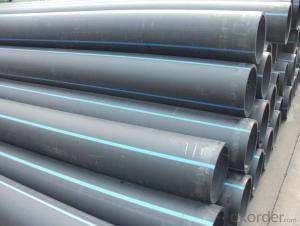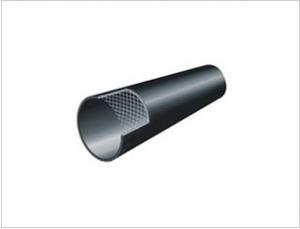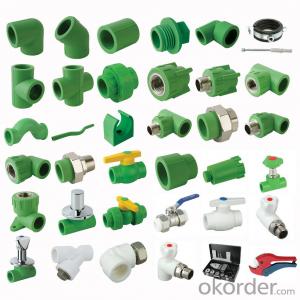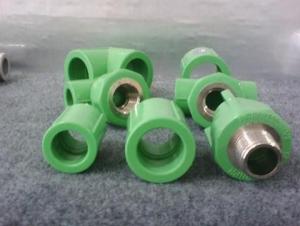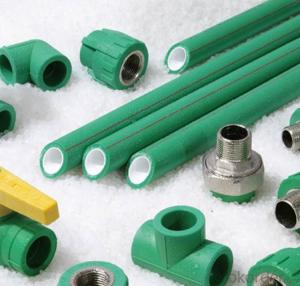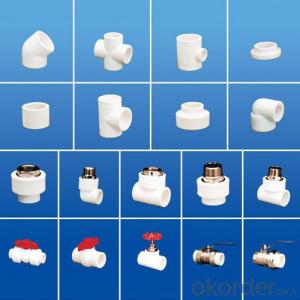Plastic Push Fittings for Copper Pipe - PPR Pipe Plastic Pipe Used in Industry Field with Superior Quality and Good Price
- Loading Port:
- Tianjin
- Payment Terms:
- TT OR LC
- Min Order Qty:
- 200 pc
- Supply Capability:
- 100000 pc/month
OKorder Service Pledge
OKorder Financial Service
You Might Also Like
Description of Products:
PP-R (polypropylene random) tube called type three polypropylene pipe and is also called the PP-R pipe or PPR pipe, with energy saving, environmental protection, high strength, corrosion resistance, with smooth inner wall has the advantages of scale, construction and easy maintenance, long service life, widely used in building water supply and drainage, urban drainage city gas and power cable sheath, and industrial fluid transportation, agricultural irrigation construction, municipal, industrial and agricultural fields. The PP-R pipe is made of random copolymerized polypropylene and is extruded into tubes to be molded into tubes.
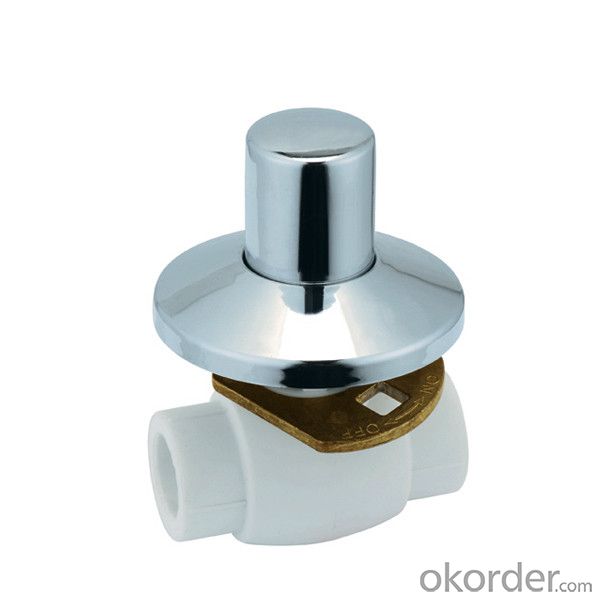
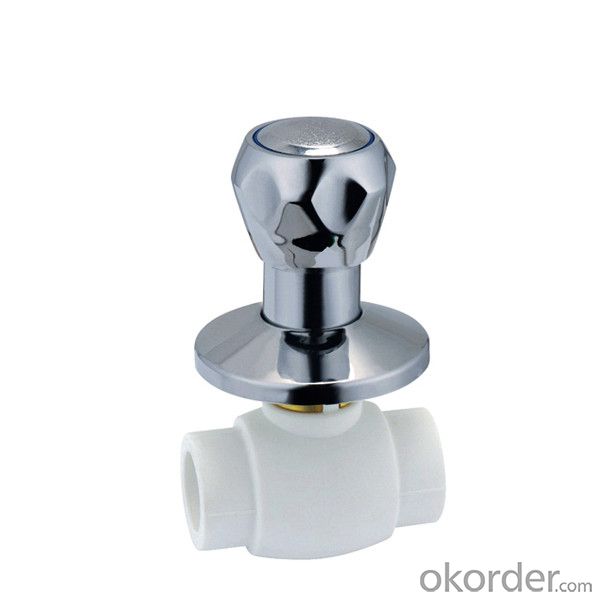
PPR Pipe Size:
PN10 | PN12.5 | PN16 | PN20 |
25*2.3 | 25*2.8 | 25*3.5 | 25*4.2 |
32*3.0 | 32*3.6 | 32*4.4 | 32*5.4 |
40*3.7 | 40*4.5 | 40*5.5 | 40*6.7 |
50*4.6 | 50*5.6 | 50*6.9 | 50*8.4 |
63*5.8 | 63*7.1 | 63*8.6 | 63*10.5 |
Specification:
Products name | Tee with Tap Connector Male |
Material | PPR |
Field of Application | Water |
Work temperature | -10℃-110℃ |
Packing | standard export package or customized |
Function | Kitchen, home, commercial, garden and general |
Application:
1) Cold and hot water systems of residence and commercial buildings
2) Transportation of industrial water supply and chemical materials
3) Pure water pipe system
4) Piping networks for rainwater utilization systems
5) Irrigation agriculture and horticulture systems
6) Transportation system of drinking water production
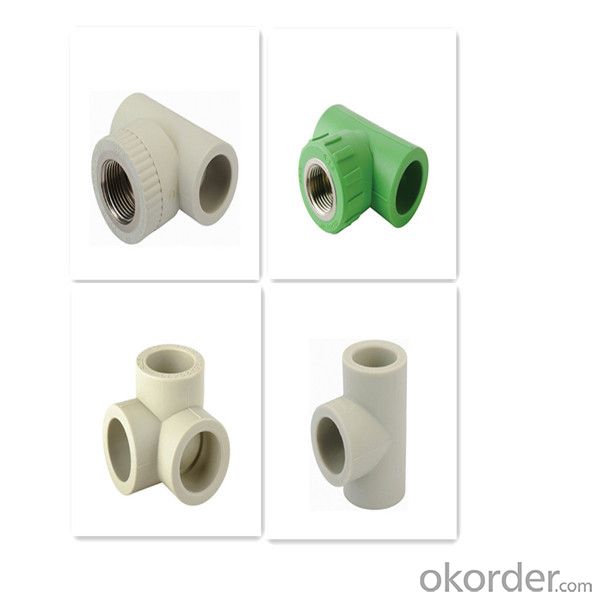
Product Feature:
1. High Temperature Resistance: the maximum sustained working temperature is up to 70°C , the maximum transient temperature is up to 95°C
2. Heat Preservation: low thermal conductivity which is only 1/1500 of brass pipe, and 1/250 of steel pipe
3. Non-toxic: no heavy metal additives, would not be covered with dirt or contaminated by bacterium
4. Corrosion Resistance: resist chemical matters and electron chemical corrosion
5.High Flow Capacity: smooth interior walls and low friction result in low flow resistance and high volume
6. Excellent Flexibility: can be supplied in coil
7. Low Installation Costs: light weight and ease of installation can reduce installation costs
8. Longevity: more than 50 years under proper use
Product Advantages:
1) Healthy, bacteriological neutral, conforming to drinking water standards
2) Resistant to high temperatures, good impact strength
3) Convenient and reliable installation, low construction expenses
4) Excellent heat-insulation property from minimum thermal conductivity
5) Lightweight, convenient to transport and handle, good for labor-saving.
Company Profile:
CNBM International Corporation (CNBM International) is the most important trading platform of CNBM Group Corporation, a state-owned company under the direct supervision of State-owned Assets Supervision and Administration Commission of the State Council.
CNBM International is highly recognized by its business partners and clients all over the world and has obtained rapid development under the spirit of win-win. We will carry on the mutual beneficial, innovative and revolutionary trading structure as we did before, create value for our employees, share holders and clients and benefit the whole society in our future development.
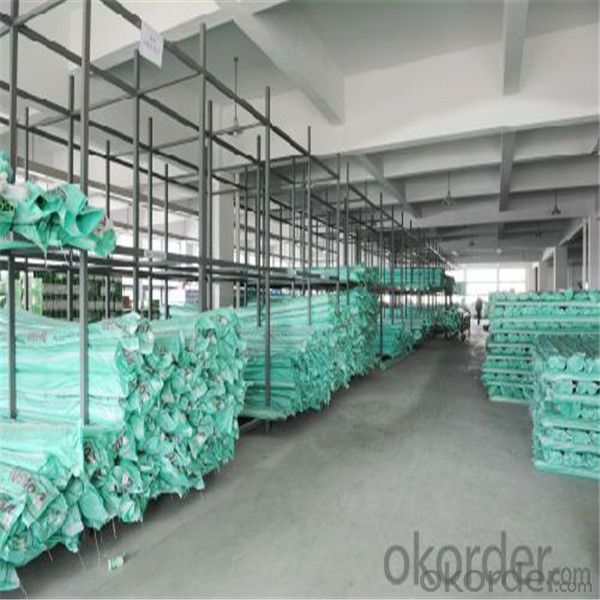
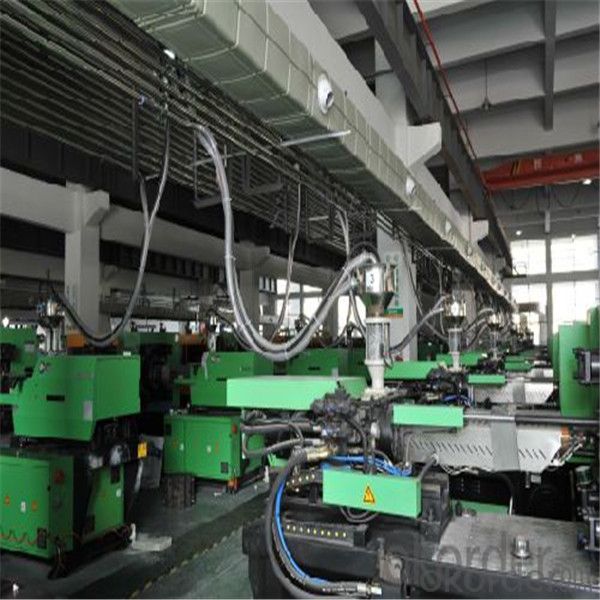
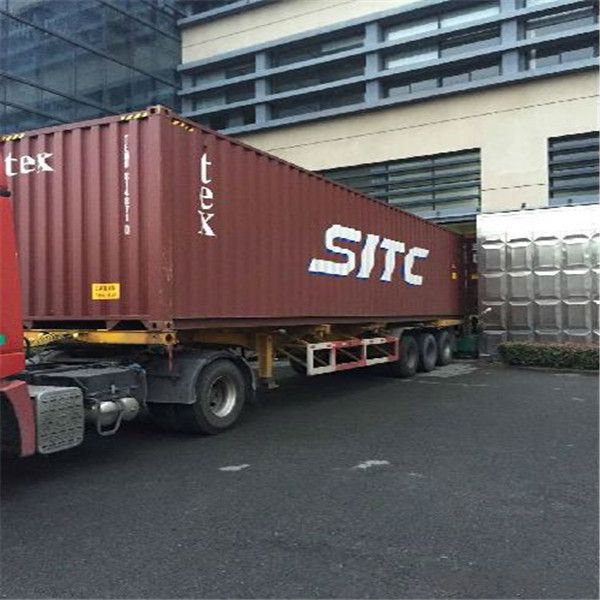
FAQ:
Q1:How Can I Get A Sample?
A1:You can get samples by communicate with our export sales.
Q2:How Long Is Delivery?
A2:Delivery time will be30-45days according to order quantity.
Q3:What Is The MOQ?
A3:MOQ depends on different items.
Q4:What Is Our Normal Payments Terms?
A4:Our normal payment terms now is: T/T, L/C or western union,paypal
- Q: Are plastic pipe fittings resistant to soil chemicals?
- Yes, plastic pipe fittings are generally resistant to soil chemicals.
- Q: Can plastic pipe fittings be used for water treatment systems?
- Yes, plastic pipe fittings can be used for water treatment systems. They are commonly used due to their corrosion resistance, durability, and ease of installation. However, it is important to ensure that the plastic material used is compatible with the specific water treatment chemicals and processes being employed.
- Q: Can plastic pipe fittings be used in wastewater systems?
- Yes, plastic pipe fittings can be used in wastewater systems. Plastic fittings are commonly used in wastewater systems due to their durability, resistance to corrosion, and affordability. They are capable of withstanding the harsh chemicals and high temperatures often present in wastewater systems. Additionally, plastic fittings are easy to install and require minimal maintenance, making them a popular choice for wastewater applications.
- Q: Can plastic pipe fittings be used in wastewater treatment systems?
- Yes, plastic pipe fittings can be used in wastewater treatment systems. Plastic fittings are commonly used in these systems due to their corrosion resistance, durability, and cost-effectiveness. They offer excellent resistance to chemicals and can withstand the harsh conditions found in wastewater treatment processes. Additionally, plastic fittings are lightweight and easy to install, making them a preferred choice for wastewater treatment systems.
- Q: Can plastic pipe fittings be used in rainwater harvesting systems?
- Yes, plastic pipe fittings can be used in rainwater harvesting systems. Plastic fittings are commonly used in these systems due to their durability, corrosion resistance, and ease of installation. Additionally, plastic fittings are typically more affordable compared to other materials, making them a popular choice for rainwater harvesting systems.
- Q: Are plastic pipe fittings more cost-effective than metal fittings?
- Plastic pipe fittings are generally more cost-effective than metal fittings. They are cheaper to produce, lighter in weight, and easier to install, which can save on labor costs. Additionally, plastic fittings do not corrode or rust, reducing the need for maintenance or replacement. However, the choice between plastic and metal fittings ultimately depends on the specific application and requirements of the project.
- Q: How do plastic pipe fittings compare to brass fittings?
- Plastic pipe fittings are generally more affordable and easier to install compared to brass fittings. However, brass fittings are known for their durability, higher resistance to heat and pressure, and better overall performance in terms of longevity. It ultimately depends on the specific needs and budget of the project.
- Q: Are plastic pipe fittings suitable for wastewater treatment plants?
- Yes, plastic pipe fittings are suitable for wastewater treatment plants. They are commonly used due to their resistance to chemical corrosion, durability, and cost-effectiveness. Plastic fittings also offer ease of installation and maintenance, making them a popular choice in wastewater treatment facilities.
- Q: Can plastic pipe fittings be used for mining applications?
- Yes, plastic pipe fittings can be used for mining applications. Plastic pipe fittings are often used in mining due to their corrosion resistance, lightweight nature, and ease of installation. They offer durability and can withstand harsh environments, making them suitable for various mining applications such as water supply, drainage, and chemical transportation. Additionally, plastic pipe fittings are cost-effective and require minimal maintenance, making them a preferred choice in the mining industry.
- Q: How do plastic pipe fittings handle extreme weather conditions?
- Plastic pipe fittings are designed to withstand extreme weather conditions quite effectively. They are typically made from durable materials such as PVC or ABS, which have excellent resistance to temperature variations, UV exposure, and moisture. These fittings can endure freezing temperatures, intense heat, and heavy rain without deteriorating or losing their structural integrity. Additionally, plastic fittings often have built-in features like expansion joints or flexible connections that allow them to adapt to changes in temperature and prevent cracking or breaking. Overall, plastic pipe fittings are reliable and suitable for various climates.
Send your message to us
Plastic Push Fittings for Copper Pipe - PPR Pipe Plastic Pipe Used in Industry Field with Superior Quality and Good Price
- Loading Port:
- Tianjin
- Payment Terms:
- TT OR LC
- Min Order Qty:
- 200 pc
- Supply Capability:
- 100000 pc/month
OKorder Service Pledge
OKorder Financial Service
Similar products
Hot products
Hot Searches
Related keywords
